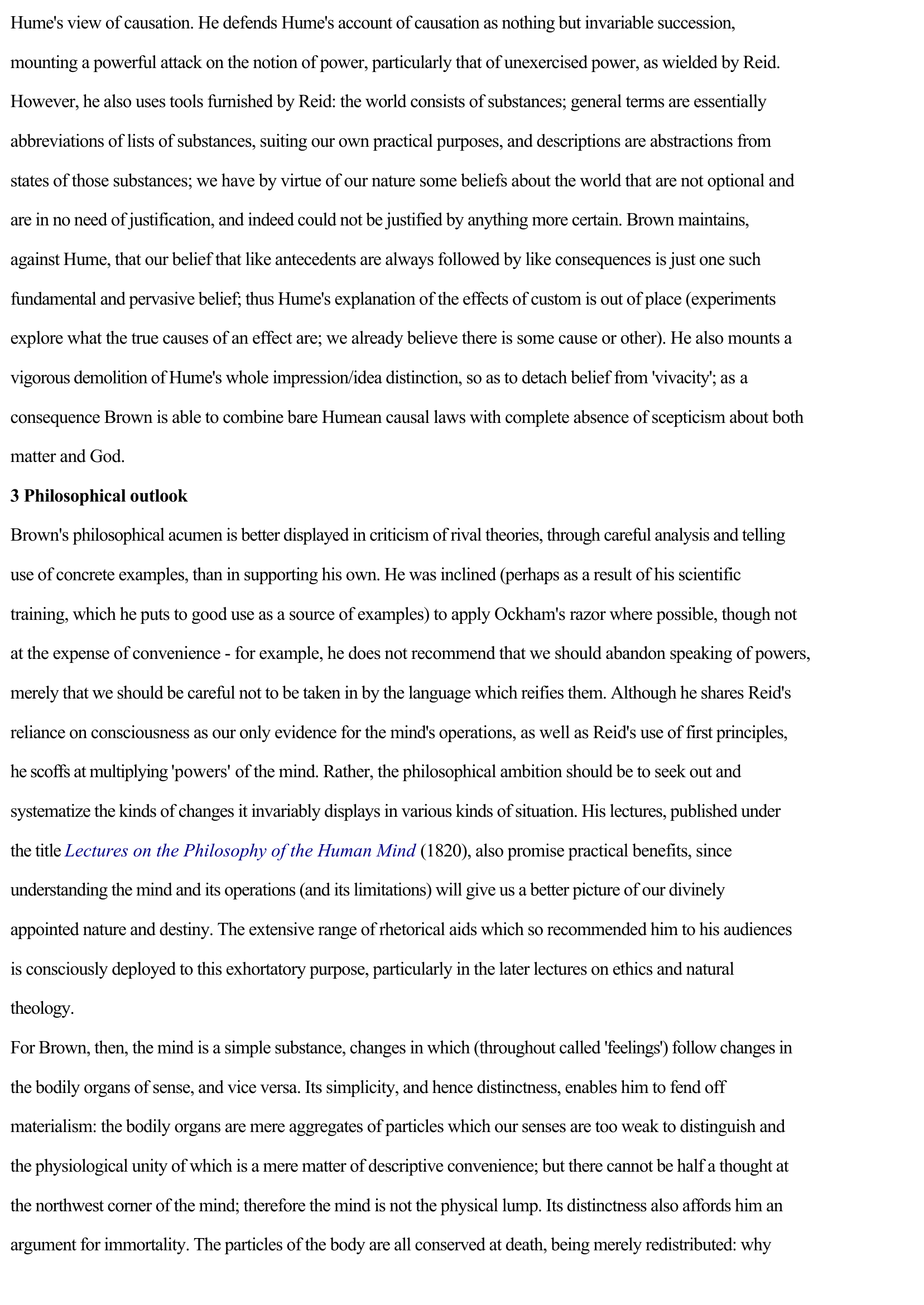Brown, Thomas
Publié le 22/02/2012
Extrait du document
«
Hume's view of causation.
He defends Hume's account of causation as nothing but invariable succession,
mounting a powerful attack on the notion of power, particularly that of unexercised power, as wielded by Reid.
However, he also uses tools furnished by Reid: the world consists of substances; general terms are essentially
abbreviations of lists of substances, suiting our own practical purposes, and descriptions are abstractions from
states of those substances; we have by virtue of our nature some beliefs about the world that are not optional and
are in no need of justification, and indeed could not be justified by anything more certain.
Brown maintains,
against Hume, that our belief that like antecedents are always followed by like consequences is just one such
fundamental and pervasive belief; thus Hume's explanation of the effects of custom is out of place (experiments
explore what the true causes of an effect are; we already believe there is some cause or other).
He also mounts a
vigorous demolition of Hume's whole impression/idea distinction, so as to detach belief from 'vivacity'; as a
consequence Brown is able to combine bare Humean causal laws with complete absence of scepticism about both
matter and God.
3 Philosophical outlook
Brown's philosophical acumen is better displayed in criticism of rival theories, through careful analysis and telling
use of concrete examples, than in supporting his own.
He was inclined (perhaps as a result of his scientific
training, which he puts to good use as a source of examples) to apply Ockham's razor where possible, though not
at the expense of convenience - for example, he does not recommend that we should abandon speaking of powers,
merely that we should be careful not to be taken in by the language which reifies them.
Although he shares Reid's
reliance on consciousness as our only evidence for the mind's operations, as well as Reid's use of first principles,
he scoffs at multiplying 'powers' of the mind.
Rather, the philosophical ambition should be to seek out and
systematize the kinds of changes it invariably displays in various kinds of situation.
His lectures, published under
the title Lectures on the Philosophy of the Human Mind (1820), also promise practical benefits, since
understanding the mind and its operations (and its limitations) will give us a better picture of our divinely
appointed nature and destiny.
The extensive range of rhetorical aids which so recommended him to his audiences
is consciously deployed to this exhortatory purpose, particularly in the later lectures on ethics and natural
theology.
For Brown, then, the mind is a simple substance, changes in which (throughout called 'feelings' ) follow changes in
the bodily organs of sense, and vice versa.
Its simplicity, and hence distinctness, enables him to fend off
materialism: the bodily organs are mere aggregates of particles which our senses are too weak to distinguish and
the physiological unity of which is a mere matter of descriptive convenience; but there cannot be half a thought at
the northwest corner of the mind; therefore the mind is not the physical lump.
Its distinctness also affords him an
argument for immortality.
The particles of the body are all conserved at death, being merely redistributed: why.
»
↓↓↓ APERÇU DU DOCUMENT ↓↓↓
Liens utiles
- Biographie de BROWN (Thomas)
- Les compliments de thomas diafoirus
- MONDE ABSENT (Le) d'Henri Thomas (résumé)
- Art POÉTIQUE FRANÇAIS, de Thomas Sebillet / de Jean Vauquelin de La Fresnaye
- QUESTIONS DISPUTÉES, Thomas d’Aquin (saint) (résumé)

































